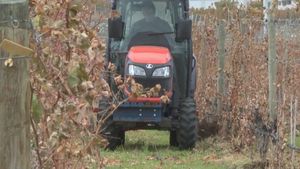On January 22, 2025, officials from Tokyo announced the emergence of a measles case involving a man residing in the city. The patient, a male in his 30s, displayed symptoms of the disease starting on January 12, before embarking on travel to Shikoku, which includes Kōchi, Ehime, and Kagawa Prefectures. Notably, he had no prior travel history or vaccination against measles, raising concerns over the potential spread of the disease.
The Tokyo resident's symptoms included fever, cough, and rash, indicating the classic signs of measles. On January 13, one day after his symptoms began, he boarded a flight from Haneda Airport, arriving at Kōchi Ryoma Airport. Following his arrival, he rented a car and explored the eastern region of Kōchi, including a visit to the Muroto Cape and the Muroto School Ruins Aquarium.
Authorities reported his movements throughout his travels. After arriving on January 13, he stayed at local accommodations and dined at various establishments including lunch at the popular Hirome Market and visits to locations like Katsurahama on January 14. This has raised alarm as these venues host large numbers of visitors, hence increasing the risk of transmission.
Subsequently, the Kōchi Prefectural authorities issued important public health communication, urging individuals who may have been at the same locations as the infected man to monitor their health. "Measles is highly contagious, and symptoms include high fever and rash," said health officials, emphasizing the need for vigilance.
Health officials also stated, "If you experience symptoms, please contact your local health office." This call was made especially urgent after reports confirmed the man visited numerous public places amid his contagious period, directly increasing the risk of exposure for unsuspecting patrons.
On January 15, the man flew back from Kōchi to Tokyo, arriving at Haneda Airport. Records indicate he spent time at the airport terminal upon his return. No reports of other individuals contacting health authorities for symptoms had been received by 5:30 PM on the same day, signaling some initial success at restricting the outbreak.
Kōchi health officials reported increasing cases of suspected measles infections following the man’s visit, heightening their alert level and enhancing preventive measures within the community. Officials are now monitoring symptom reports closely, emphasizing the importance of vaccinations. They reminded residents and visitors alike about the high contagiousness of measles and how it can swiftly propagate among unprotected individuals.
The virus remains particularly dangerous to those without immunizations, and health experts stress getting vaccinated is the most effective way to prevent such infections. The authorities reiterated, "Those who visited locations between January 13 and 14 and are experiencing symptoms like fever or rash should contact health services immediately. We are thoroughly investigating all potential exposure sites."
The outbreak has drawn attention to public health protocols surrounding vaccinations and the importance of rapid identification and containment of infectious diseases, especially as travel resumes post-pandemic.
With wandering tourists and residents moving fluidly through public spaces, the transmission of diseases like measles remains a looming threat, one which public health officials are now striving to mitigate through increased awareness and accessible vaccination efforts.
This incident serves as a wake-up call about the importance of vaccination, particularly as historic vaccination rates have dropped across various demographics. Community health initiatives may soon pivot to address these declines, ensuring increased immunity among the population moving forward.
By urging people to vaccinate and report pertinent health issues, public health authorities aim to stave off significant outbreaks, and be equipped effectively should similar cases arise.
The case encapsulates the complex intersection of travel, public health, and community responsibility as officials work tirelessly to protect citizens from the possible resurgence of preventable diseases.



